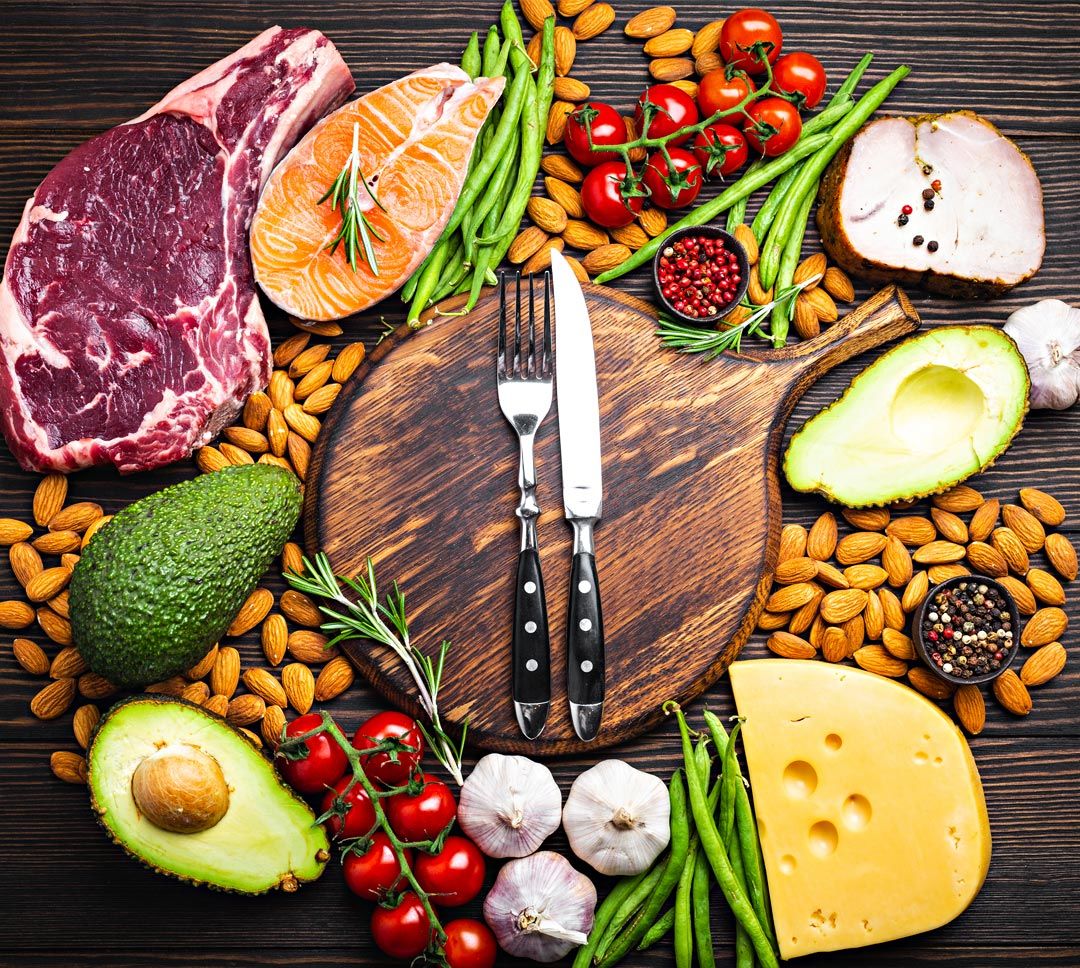What is ketosis?

Fat is healthier than its reputation suggests
The ketogenic diet is becoming increasingly popular, despite the fact that it contradicts many of the things we think we know about healthy eating. For most people, fat has a very bad reputation. High-fat diets are said to be the main cause of obesity, diabetes and atherosclerosis, which can lead to other medical problems like heart attacks and strokes. In short, most people have learnt that a low-fat diet is healthier than a high-fat diet, and that a large part of a healthy diet should consist of carbohydrates (e.g. wholemeal products). Although there is a lot of truth in this, it is not the whole truth. A high-fat diet can actually be very healthy. The health benefits of a ketogenic diet have been confirmed in a large number of studies in the field of nutritional medicine.
The keto diet: Up to 90% fat
In a ketogenic (keto) diet, 75% to 90% of nutrients come from fats. A keto diet is one that is very low in carbohydrates. The maximum is around 50 grams of carbohydrates per day. By way of comparison, a small portion of wholemeal pasta (100 grams) contains 60 grams of carbohydrates – and is therefore already more than the total daily amount for a keto diet. In other words, following a keto diet means cutting out carbohydrates almost completely.
In this respect, a keto diet is the complete opposite of what many nutritional guidebooks present as healthy. Nevertheless, a keto diet offers numerous benefits. So where do these benefits come from? The short answer is: from ketosis, or fat metabolism. Read on to find out more.
The ketogenic diet leads to ketosis
Metabolism is the body’s way of producing energy. There are actually many different metabolic processes.
The main metabolic processes
The human body uses countless metabolic processes to provide energy and building blocks for the cells.
Carbohydrate metabolism breaks down complex carbohydrates like oligosaccharides from food into monosaccharides like glucose and fructose in the intestine. The sugar molecules are carried by the blood to the cells, where the real metabolic processes take place. This enables the body to obtain energy from glucose, for instance, quickly and easily. Once our energy and sugar stores are full, monosaccharides are stored in the form of fat.
Fat metabolism is another process used for energy production in the cells. Fats are the most important energy reserves. But fat does much more than this. Many people are not aware that fat is not just a source of energy. Fats contain essential fatty acids that the human body cannot produce by itself. In addition, the body needs fatty acids to produce other substances, including hormones. It is only the fat that the body cannot use immediately that is stored in fat cells.
Protein metabolism breaks down proteins into their component parts: amino acids. The amino acids are carried by the blood into the cells where – in the absence of carbohydrates or fat – they are also used to produce energy. Above all, however, our body needs proteins – or rather the amino acids – as building blocks for e.g. muscle cells, hormones and enzymes. The body produces more than 50,000 different proteins – from just 20 amino acids. Of these 20 amino acids, we have to obtain 9 (the essential amino acids) from our food because the human body cannot produce them.
Mineral metabolism produces e.g. calcium and phosphorus to build bones. Without calcium ions, for instance, the nervous system would not function and we would be unable to feel pain or move our muscles.
These metabolic processes are very flexible, enabling the body to use a range of different energy sources. The body simply switches between metabolic processes as required. We can make use of this ability through targeted diets and exogenous ketone supplements that specifically promote ketosis and fat metabolism.
The health risks of high-sugar diets
Carbohydrate-rich diets are the norm in most parts of the world. This is why most people burn carbohydrates most of the time. Their bodies hardly ever enter ketosis – the special fat-burning state. Although they are widespread, diets rich in carbohydrates, and therefore in sugar, harbour some health risks. Classic eating habits promote obesity and atherosclerosis, with the associated increased risk of heart attacks and strokes. The risk of diabetes also increases. In addition, there are indications that high blood sugar levels may increase the risk of Alzheimer’s disease.
What is ketosis? Fat metabolism is a natural process
Ketosis is a metabolic state in which the body obtains nutrients and energy primarily from fat. This happens whenever the body can no longer obtain the energy it needs from carbohydrates (and the sugars they turn into). Ketosis is therefore the metabolic process in which the cells’ energy is obtained from fat burning and from the resulting ketone bodies. The human body enters ketosis when our metabolism uses ketone bodies as the main energy source.
Ketones (ketone bodies) replace sugars as energy carriers
In terms of evolution, ketosis is the body’s answer to a long-term shortage of plant-based foods that are rich in carbohydrates. Ketosis is a natural process that has ensured our survival for millions of years. It is sometimes called starvation mode, since it only occurs naturally when there are insufficient quantities of glucose (or other sugars) in the blood and tissues.
Starvation mode sounds worse than it is. The advantages of ketosis include, for instance, the fact that the ketones it releases suppress the appetite (see also: The ketone effect). This in turn can promote the breakdown of fat reserves, make it easier to lose weight and reduce the health risks that are associated with excess fat.
How does the body switch to ketosis?
In normal circumstances, our metabolism enters ketosis:
- after at least 12 hours of fasting (intermittent fasting)
- when we follow a low-carb keto diet for a longer period
- after or during periods of high exertion that use up all the glucose stores from the muscles and liver
Only then does our body turn to fat reserves as fuel. This is when it enters ketosis and produces ketones, or ketone bodies.
Exogenous ketones in the form of ketone esters and ketone salts
Exogenous ketone supplements come in two different chemical forms: ketone salts and ketone esters. The active substance in both forms is the most stable ketone body: beta-hydroxybutyrate (BHB).
Ketone esters consist of a ketone body that is attached to a ketone precursor like butanediol or glycol. They are used primarily by elite athletes and are said to be effective at supplying the muscles with energy over a sustained period. Only a few keto drinks containing ketone esters are available at the moment. This is likely to be in part because of the high cost, and partly because they taste strongly of solvents.
Ketone salts bind the ketone body beta-hydroxybutyrate (BHB) to a mineral – generally to sodium, calcium or magnesium. Food supplements containing ketone salts usually come in powder form and are dissolved in water to make a drink. The exogenous ketones sold by Orthoformula (KETO//OS NAT) bind beta-hydroxybutyrate to a particularly well-balanced combination of sodium, calcium and magnesium. The proportion of sodium is somewhat higher because ketones bound to sodium enter the bloodstream quickly. Calcium and magnesium are absorbed more slowly, so contribute to sustained ketone utilisation.
Are exogenous ketones necessary for ketosis?
No. Exogenous ketones are not necessary for ketosis. A keto diet also leads to ketosis sooner or later, which causes the endogenous ketones to take effect. To keep up production of endogenous ketones, however, the diet needs to be consistently ketogenic, i.e. high in fats and low in carbs. Not everyone finds it easy to cut out carbs.
Exogenous ketones: How to achieve ketosis without following a keto diet
Taking exogenous ketones in the form of food supplements is therefore a good choice when you are still making changes to your diet, or if you find it difficult to cut out carbs. Exogenous ketones are also an ideal supplement to take alongside a keto diet. Ultimately, by taking exogenous ketones, you can achieve the effects of ketosis without altering your diet.
More about exogenous ketones
- The effect of exogenous ketones
The benefits of a ketogenic diet come primarily from the effect of ketones, of which the most important is beta-hydroxybutyrate (BHB). Studies confirm the great health benefits of BHB. - Exogenous ketones in KETO//OS NAT
Exogenous ketones can work like the body’s own ketones – and achieve the same positive effects for performance and health as the ketosis triggered by a keto diet. However, for this to happen, the exogenous ketones have to be in a form the body can use. This bioavailability is one of the special product characteristics of KETO//OS NAT, the exogenous ketones from Prüvit. - FAQ – Exogenous ketones
In the FAQ on exogenous ketones you will find answers to common questions about exogenous ketones and the ketogenic diet. - Keto-friedly-foods
Which foods are suitable for a keto diet? Which foods are particularly good for putting your metabolism into ketosis? And what can you eat to stay in ketosis over the long term? We have pulled together plenty of recommendations for you. And we also reveal which foods you should avoid on a keto diet.
All information about exogenous ketones

Buy KETO//OS NAT
You won’t find KETO//OS NAT in the shops. Exogenous ketones from Prüvit are only available from selected Prüvit distributors like Orthoformula.

Recommend KETO//OS NAT
Impressed with KETO//OS NAT? Then why not share your experience? You can earn discounts or build a business – and we’ll help you.

Exogenous ketones & ketosis
Exogenous ketones are not a miracle cure. But they do support you in a number of ways – like the motor on an electric bike, giving you the energy you need to achieve your goals.